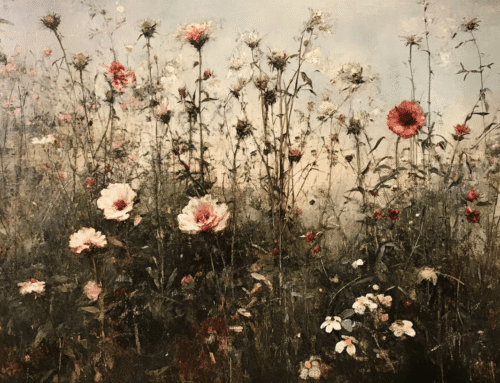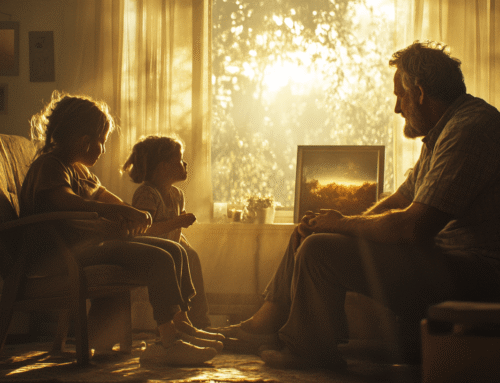Grip the water and you sink. Relax and you float.
That’s the whole lesson, hidden in plain sight.
Alan Watts points to a paradox: the tighter we clutch—reputation, plans, approval—the heavier life becomes. “Not caring” isn’t apathy; it’s elegant trust. It’s loosening our fist so life can place something better in our palm.
This is a gentle guide for living with open hands instead of clenched ones.
1) What “Not Caring” Really Means
It’s easy to mistake not caring for indifference. It’s not.
Not caring = caring cleanly. It is the freedom to care where it matters and release what doesn’t.
-
Not apathy, but grace.
-
Not numbing out, but showing up without a white-knuckle need to control outcomes.
-
Not “nothing matters,” but choosing what matters—and letting the rest pass like clouds over a still lake.
When we stop performing for an imaginary audience, we return to the only stage that’s real: this breath, this moment.
2) Empty the Cup
Watts’ tea story is simple: the teacher keeps pouring until the cup overflows. The mind crammed with worry, comparison, and “what will they think?” has no room for peace—or new insight.
Practice:
When anxiety surges, pause and silently say, “Empty the cup.” Breathe out longer than you breathe in. Imagine tipping stale thoughts out of the rim. Space is sacred; it invites wisdom.
3) The Rope and the River
Clinging can feel noble. But clinging is burn—like gripping a rope behind a galloping horse. Letting go isn’t surrendering life; it’s riding it differently.
-
Clutching = friction and fatigue.
-
Allowing = rhythm and right timing.
Many of our best moments arrive when we stop forcing: the joke that lands when we relax, the solution that appears after a walk, the calm that comes when we stop stirring muddy water and let it settle.
4) Step Out of the Marketplace
Most of us live in a mental bazaar selling approval: Work harder and earn my respect. Agree with me and I’ll grant belonging. We spend ourselves on imaginary vendors.
Exit sign: Step from the market into the quiet forest—out of other people’s opinions and into the wind on your own skin. There, you remember who you are without a scoreboard.
5) Do Your Work, Then Step Back
Ancient wisdom repeats it: Act, then release.
The moon doesn’t hurry; the tides still obey. You do your honest work—and then let the outcome belong to life.
This isn’t passivity. It’s the end of tug-of-war with what you can’t control. Paradoxically, your work improves when your grip loosens. Precision follows presence.
6) Criticism as a Passing Cloud
When criticized, the body clenches—jaw, belly, breath. The mind prepares its lawsuit.
Practice:
Let the words float as weather. Don’t swallow the storm. Ask, “Is there one grain of truth I can use?” If yes, take it and leave the rest to blow by. Strength isn’t arguing every gust; it’s knowing when to shelter and when to walk on.
7) Kintsugi Heart
In kintsugi, cracked pottery is mended with gold, the lines of breakage made luminous. Your life is like that. The places you were sure would ruin you often reveal your golden grain.
Perfection hides the gold; honesty makes it shine. Not caring about looking flawless frees you to be whole.
8) Dance in the Noise
Life honks and barks. Still, the dancer moves in time to a deeper music. Caring “just enough” means you act with attunement, not anxiety. You aim cleanly, breathe steadily, and let the arrow fly when it’s ready—not when fear says “hurry.”
Presence is accuracy. Tightness is tremor.
9) The Quiet Garden Within
At the city’s centre is a hidden garden: a stillness untouched by praise or blame. You don’t build it; you enter it.
Practice:
Several times a day, stop for 20 seconds. Feel your feet. Hear one distant sound. Notice one nearby texture. Let your attention drop into the body. You will remember: I am not behind schedule. I am here.
10) Choose What Matters
Not caring is pruning. You don’t stop loving—you stop watering every weed.
-
Ignore transient noise.
-
Tend a few living priorities.
-
Create with devotion—and let the tide reshape your castles when it must. Children know this: they build, laugh, rebuild. No tragedy—just play.
You are under no obligation to be the person you were five minutes ago.
11) Roles, Seasons, and Letting Go
We all wear roles: diligent worker, perfect parent, tireless friend. “Not caring” invites you backstage to remember you are more than any part you play.
Trees don’t cling to leaves in autumn; they let them fall with elegance. Some opinions, identities, and relationships have finished their season. Letting go is not loss; it’s the door to the next chapter.
12) You Won’t Lose Your Fire
The fear: If I care less, I’ll become careless.
The truth: when you stop caring about the wrong things, you gain energy for the right ones. The soul’s fire burns hotter when it’s not smothered by performing.
Strong doesn’t mean rigid; strong is bamboo, bending without breaking.
13) Be the Singing Traveller
Two people meet a storm. One shakes his fist at the rain. The other opens his hands, lets the drops kiss his face, and walks on singing. The rain doesn’t change; the journey does.
Every day offers that choice. Fury or song. Resistance or rhythm.
14) A Small Ritual to Live Lightly
Right now, unclench your jaw. Drop your shoulders. Inhale softly; exhale longer. Ask:
-
What burden can I set down today?
-
What mask can I stop holding up?
-
Where can I trust the river to carry me a little?
You were always lighter than you thought.
Gentle Reminders
-
Float, don’t thrash.
-
Empty the cup.
-
Do your work, then step back.
-
Let seasons turn.
-
Choose song over struggle.
The art of not caring is not the end of passion; it’s the beginning of peace. Not indifference, but intimacy with life. Open hands. Open eyes. Open heart. And when the world gets loud, return to the still water inside—you’re already whole.






